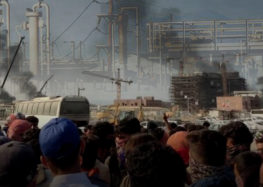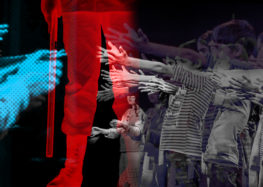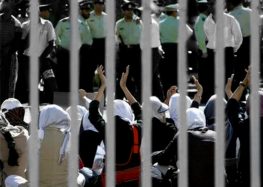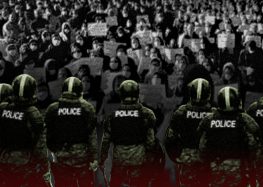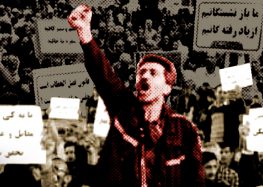The Professional Middle Class, Small Business Owners, and Bazaaris
 A Growing Crisis: The Impact of Sanctions and Regime Policies on Iranians’ Economic and Social Rights
A Growing Crisis: The Impact of Sanctions and Regime Policies on Iranians’ Economic and Social Rights
The Professional Middle Class, Small Business Owners, and Bazaaris
Signs of contraction in the size and standard of living of the middle class also abound. The rampant consumerism “of a year or so ago, before sanctions started to bite . . . [and] the middle class splurged on food and consumer goods”[168] has disappeared. The price of imported consumer goods, which constituted 21 percent of imports, and which were for the most part consumed by the middle class, has increased by a factor of 2 to 3, and are increasingly out of reach. A 28-year-old journalist from Tehran interviewed by ICHRI asserts, “The price of electronic and digital goods has gone through the roof. . . . [M]any journalists are no longer able to [buy] personal computers. For example, an Apple laptop, which could previously be bought for 25 million rials, now costs more than 50 million.”[169] In another ICHRI interview, a 34-year-old information technology professional states, “Iran’s negative rate of economic growth has resulted in the reduction of people’s purchasing power, and the decline in the value of our currency has resulted in the increase in the value of imports. For example, electronic goods, which used to be sold on the market with the value of $1 dollar to 12,000 rials, are now sold at the value of $1 dollar to 24,000 rials. The price of a Sony laptop that could previously be bought for 12 million rials has now doubled.”[170]
The price of other consumer goods has similarly increased. A Tehran-based journalist interviewed by ICHRI noted that items such as basic toiletries “have become scarce and out of reach.”[171] In another ICHRI interview, an economics reporter in Iran complained about the rise in the prices of clothing and shoes: “Roughly three years ago, I bought a pair of shoes for my wedding for 2 million rials. Yesterday, I priced a virtually identical shoe. The salesman said it would cost at least 4.5 million rials. . . . It is unfair for us [ordinary people] to pay the price of the political squabbling between the two sides [Iran and the West].”[172] The price of automobile spare parts and big-ticket items like automobiles and washers has also risen sharply. In an interview with the BBC Persian Service in October 2012, a taxi driver stated, “Setting aside the issue of eating, each gyration in the value of the dollar creates a correspondingly scary increase in the cost of spare parts. My car is my living. . . . If I am not able to maintain it, I won’t be able to buy bread.”[173] Meanwhile, Leila, a Tehran-based correspondent interviewed by ICHRI, notes the unprecedented rise in the price of a domestically manufactured car that she had pre-ordered: “I ordered a Persia [(name of the car)] from Iran-Khodro,” the nation’s largest automobile manufacturer. “But due to the sanctions and the scarcity of parts, not only did they delay delivering my car by three months, they also increased the price from 250 million rials to 360 million. Now we have no choice but to pay.”[174]
Iranians from the lower and middle echelons of the middle class, who do not own their homes, face an increasingly difficult struggle with the rise in the cost of rent and food, and the halving of their savings by inflation. According to the Statistical Center of Iran, residential rentals rose by some 60 percent in the second half of the Iranian year ending in March 20, 2012.[175] It is important to note that the statistics put out by the Iranian government are notorious for their misrepresentation of facts and are frequently criticized even by officials for presenting a rosy picture of the nation’s social and economic indicators. In late August 2012, a housewife in Tehran told ICHRI in an interview that rents had risen by another 50 percent between March and August 2012.[176] In another ICHRI interview from Tehran, the owner of a small restaurant relayed that the rent for a modest 40-square-meter apartment had risen from 1.7 million rials per month (with a deposit of 60 million rials) three years ago to 2.55 million rials (with a 60-million-rial deposit) last year, to 5 million (with a 60-million deposit) this year.[177]
At the same time, a large array of food items are either disappearing or being transformed into infrequently used luxury items. Lamenting the decline in her family’s living standards, a 47-year-old housewife from Tehran told the BBC, “My husband is a physician, and his income is not bad. But . . . our family’s consumption basket is becoming emptier by the day.”[178] Rozhin, a 30-year-old homemaker, told the Washington Post, “Food has become like gold. . . . Now I can afford to buy meat only for my daughter.”[179] Meanwhile, Nasrin, a 26-year-old from the largely middle class city of Karaj, said in a BBC Persian interview, “I go out with my child. She sees fruits, and asks for them. But if I buy her fruit, I won’t be able to cover my necessary expenses. Previously, we were able to afford one meal with meat or chicken per week. But now the situation is such that we’ve had to give up meat.”[180] Golnaz, who has worked as a government employee for the past 40 years in Arak, relayed in an ICHRI interview that she had stopped purchasing “unnecessary” goods, such as clothing in order to be able to buy food. Even so, she finds chicken and meat “frighteningly expensive,” and generally out of reach. Still, she considers herself more fortunate than some of her co-workers, who have had to “resort to eating plain pasta.”[181] At the same time, while the price of dairy products has risen inordinately in the course of last year, according to eyewitnesses in Iran interviewed by ICHRI, dairy producers, who are struggling to survive because they rely on imports for powdered milk and packaging, leave up to a third of their containers empty in order to economize.[182]
Indeed, even state jobs no longer offer security. An IRGC official “admitted in an interview with the corps’ own publication Sobh-e Sadegh that the government had been late in paying soldiers their wages.”[183] According to the Economist magazine, “civil servants [and others on fixed salaries] have been reduced to moonlighting in menial jobs to make up for their shrinking buying power.”[184] In an interview with BBC Persian, Esfandiyar from Tabriz remarked, “My income does not cover my expenses. I have therefore taken to working as a cabbie [as well]. These sanctions put greater pressure on the Iranian people, not the regime. It does not make a difference for the government whether there are sanctions or not. The US claims to be a proponent of human rights. How is it being a promoter of rights with all the pressures that are being imposed on the Iranian people?”[185]
The decline in the living standard of middle-class Iranians has also exacerbated the plunge in the economic wherewithal of shopkeepers and merchants, who largely depend on this class for the purchase of their goods and services. In interviews with a reporter from the Toronto Star in January 2013, members of the grand bazaar in Isfahan noted that the substantial drop in discretionary spending has been devastating for the bazaar, as people were now refraining from buying such items as rugs, jewelry, and electronic goods. One jeweler told the Star reporter that his sales were two to three times smaller this year than the previous year, and that he would be compelled to close his shop if current conditions prevailed.[186]
Such sentiments apply to the bulk of the bazaari community throughout the country, particularly those with limited or no contact to the regime and thus without access to the most favorable subsidized rate of currency exchange. In a phone interview with ICHRI in the summer of 2012, a shop keeper in Tehran observed that his annual sales had dropped to a quarter of what they had been a year earlier.[187] In October 2012, one manufacturer who had just closed his factory captured the sentiments of the bazaari community regarding the fluctuations in the Iranian currency when he told the BBC, “We don’t even know how much we should sell the goods we have. If we want to sell them at the price of the free market, no one could afford to buy them.”[188]
Shortly before these interviews, Tehran’s bazaar merchants, who represent a major force in the economy, staged a strike in September 2012. It ended only after security forces threatened to arrest merchant union leaders and revoke members’ licenses.[189] The bazaaris were enraged with the government’s inaction regarding the decline in the value of the rial. Giving voice to their frustration, a prominent bazaar merchant with offices in Iran and Dubai made the following statement to the Wall Street Journal in January 2013: “The merchants and business people are caught between the clerics’ fight with the West. . . . [W]e won’t be able to survive.”[190]
Entrepreneurs and small business owners operating outside the bazaar appear to be similarly dejected. Speaking to ICHRI in September 2012, a hitherto successful importer of foodstuffs stated, “We can no longer use proper banking channels for the transfer of money, and going to sarafis,” traditional money dealers who transfer money informally through contacts throughout the world, “has increased our costs. At any rate, our last experience with proper banking channels also proved to be highly disappointing. When we bought our goods on credit, the price of the dollar to the rial was 1 to 18,000. When we were ready to pay, the ratio had increased to 22,000. Finally, the government’s arbitrary decision to ban the import of 2,000 items into the country on the purported objective of promoting domestic producers proved to be devastating for our business, as 25-30 percent of our product line, on which we had spent an inordinate amount of advertising money, was suddenly wiped out.”[191]
Similarly, an importer of petroleum and refining equipment interviewed by ICHRI, who asked to be identified only by his first name, Mohammad, noted that the plunge in the value of the rial and late payment on the part of the government had brought his once prosperous business to the verge of bankruptcy. He had placed a large number of orders to European, mainly Dutch, companies last year, when the price of the euro was 1 to 150,000 rials. Due to the sanctions, the products arrived 13 months late, by which time the price of each euro had risen to 340,000 rials. In spite of these changes, the government-owned Iranian oil company for which Mohammad was serving as a contractor refused to pay him on the basis of the new price of the euro, forcing him to cover the difference. Moreover, complaining about lack of funds, the oil company also did not pay him in a timely manner after the delivery of the goods. After having to lay off more than 60 percent of his employees, Mohammad stated in the interview, “The impact of the sanctions has increased hugely in the course of last year. . . . [T]he government as well as those connected to it benefit from the current situation, while we the people suffer. The government covers its budgetary shortfall by selling petro-dollars at higher and higher prices, and those with connections get access to subsidized exchange rates, and make a killing by selling their imports at free market prices.”[192]
Ehssan, a restaurant owner in an upscale neighborhood in Tehran, noted that after the imposition of sanctions and increase in the price of meat and poultry, the demand for his more expensive (and profitable) meat dishes plunged precipitously. In an interview with ICHRI, he said, “It was as though people had turned vegetarian overnight.”[193]
Another hard-hit group, composed overwhelmingly of the offspring of the middle class, is the Iranian student population studying abroad. According to the Wall Street Journal, “Some 90,000 Iranian college students abroad are in limbo after the government cut the subsidized exchange rate it allowed for students’ tuition abroad. Many say they are abandoning their studies in the face of the rial devaluation. Yet they have few prospects back home.”[194] Leila, a student in Tehran, told the BBC, “A year ago, I decided to continue my studies at a European university. I was planning to leave Iran in February. But I am faced with a huge leap in currency prices. It . . . made it impossible for me to continue my studies outside.”[195]
Students inside the country are encountering difficulties as well. Beginning with the start of the Iranian school year in 2012, the Islamic Azad University, which enrolls more than half of all Iranian college students, raised its tuition by 15 percent,[196] and further tuition increases are likely. Iranians are not able to pay for their subscriptions to scholarly journals published in the West, or to join Western-based trade associations, because Western banks refuse to transfer money into and out of Iran, and credit cards issued to Iranians outside Iran cannot be used if the address provided to the journal or association is inside Iran.[197] Largely due to such restrictions, Iranian universities are being cut off from networks that gather, classify, and offer access to a wide array of scholarly journals and articles over the Internet.[198]
It has also become challenging for lower-middle-class primary and secondary students in Iran to pursue their education, as the devaluation of the Iranian currency has brought about an increase of roughly 100 percent in the price of notebooks and other reading and writing materials. Indeed, due to persistent rises in the cost of paper and publishing, along with the need to devote one’s income to the purchase of absolute necessities, the purchase of books, journals, and magazines is becoming out of the reach for the majority of Iranians.[199]
_______________________________
[168] Christopher de Bellaigue, “Sanctions Have Crippled Iran’s Economy, But They’re Not Working,” New Republic, November 12, 2012.
[169] International Campaign for Human Rights in Iran Interview with a Tehran-based journalist on August 2, 2012. The journalist did not want his name to be used.
[170]International Campaign for Human Rights in Iran telephone interview with a Tehran-based IT expert on July 28, 2012. The expert requested anonymity.
[171] International Campaign for Human Rights in Iran interview with a Tehran-based journalist on August 2, 2012. The journalist asked that his name be
withheld.
his name.[173] “The Unprecedented Rise In the Currency Rate: Listening to People’s Complaints,” BBC Persian, October 1, 2012.[174] International Campaign for Human Rights in Iran interview with a Tehran-based reporter, who wanted to be identified only by her first name,
on September 2, 2012.[175] “Statistical Center: Residential Rentals In Iran Rose By 60 Percent In One Year,” Radiofarda, September 13, 2012.
[176] International Campaign for Human Rights in Iran interview with a 35-year-old middle-class housewife with a BA on August 26, 2012.
[177] International Campaign for Human Rights in Iran interview with a small restaurant owner in Tehran, who asked that his name be withheld, on
August 17, 2012.
[178] Ibid.
[179] Najmeh Bozorgmehr, “In Iran, Isfahanis Shrug Off Risk of Attack,” Washington Post, September 7, 2012.
[180] “What Are the Iranian People Saying About Sanctions,” BBC Persian, July 3, 2012.
[181] International Campaign for Human Rights in Iran interview with a government employee from Arak on September 27, 2012, who asked to be identified by her first name.
[182] International Campaign for Human Rights in Iran interview with an entrepreneur in Iran, who requested that his name be withheld, on September 25, 2012.
[183] Related by Thomas Erdbrink, “Already Plagued By Inflation, Iran Is Bracing For Worse,” New York Times, July 1, 2012.
[184] “Iran Sanctions: When Will It Ever End?” Economist, August 18, 2012.
[185] “What Are the Iranian People Saying About Sanctions?,” BBC Persian, July 3, 2012.
[186] As reported in translation in “Sanctions Have Destroyed Isfahan’s Bazaar,” Radiofarda, January 29, 2013.
[187] International Campaign for Human Rights in Iran interview with a Tehran shopkeeper, who requested that his name be withheld, on July 24, 2012.
[188] Mark Gregory, “Iran Rial: Mahmoud Ahmadinejad Blames Slide on ‘Enemies,’” BBC, October 2, 2012.
[189] Farnaz Fassihi and Jay Solomon, “In Iran’s Factories and Shops, Tighter Sanctions Exact Toll,” Wall Street Journal, January 4, 2013.
[190] Ibid.
[191] International Campaign for Human Rights in Iran interview on September 12, 2012, with an Iranian businesswoman, who asked that her name not be divulged.
[192] International Campaign for Human Rights in Iran interview with an Iranian businessman on September 3, 2012.
[193] International Campaign for Human Rights in Iran interview with an Iranian businessman, who has asked that his name not be revealed, on September 20, 2012.
[194] Farnaz Fassihi and Jay Solomon, “In Iran’s Factories and Shops, Tighter Sanctions Exact Toll,” Wall Street Journal, January 4, 2013.
[195] Mark Gregory, “Iran Rial: Mahmoud Ahmadinejad Blames Slide on ‘Enemies’,” BBC, October 2, 2012.
[196] Maghreb Newspaper, September 9, 2012.
[197] International Campaign for Human Rights in Iran interview with a 33-year-old Iranian engineer on September 19, 2012.
[198] “Sanctions Make It More Difficult for Students to Access Scientific Sites,” BBC Persian TV, January 25, 2013, http://www.bbc.co.uk/persian/world/2013/01/130125_l93_elzvir.shtml.
[199] International Campaign for Human Rights in Iran interview with an Iranian bookstore owner, who does not want to divulge his identity, on September 30, 2012.

